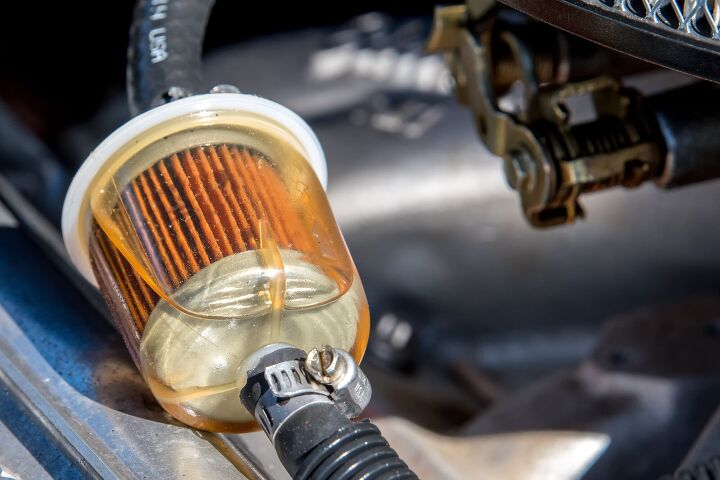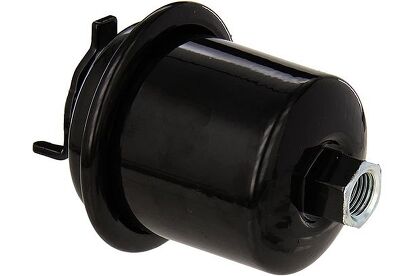Best Fuel Filters: Fuelish Behavior
Top 8 Best Fuel Filters
This is a slightly difficult list since virtually every vehicle on the road takes a different type of fuel filter. Unless you’re driving a GM product from the ’90s; experience shows they all used roughly the same one from about 1990 until about 2008. Also, know that there typically aren’t service intervals for the replacement of these things – generally, when they go bad, you know.
Still, they’re an important part of your hooptie’s fuel delivery system, especially if your whip is particularly knackered. A terrible Crown Vic that darkened your author’s driveway had a fuel tank so rusty I moved the fuel pickup much higher than any location approved by Ford. This was in an attempt to stave off the sucking up of iron oxide filings which would plug the – you guessed it – fuel filter. This repair (and I use that term loosely) resulted in an unexpected complication: the Vic would quit when the gas gauge still read three-quarters.
Anyway, enough storytime. The options on today’s list are grouped as apples-to-apples options for a car representative of the typical daily beater. Others exist, so make sure you check your specific application before mashing the Buy Now button.
Table of Contents
-
Editor's Choice: Genuine Honda Fuel Filter SetBuilt by the people who built the car (not really but you get the point)
-
Cost vs convenience
-
Read the reviews
-
There are tons of these in use today
-
Know what you're buying
-
Using "tryna" in your feedback nullifies it immediately
-
Break out the file or rasp just in case
-
Seems to be a good deal
1. Editor's Choice: Genuine Honda Fuel Filter Set
We're breaking from tradition with this list and arranging our selections from most to least expensive. While it is true these types of parts do sometimes have different internal gubbins that affect their performance, a lot of people simply buy on price. Use your discretion.
This is listed as a factory OEM part from Honda, partially explaining its price which is two or three times the cost of others on this list. The seller asserts this is not an aftermarket part and the reviews seem to bear that out in terms of OE fitment. Back in the day, Honda used to have an advertising tagline that read "Don't open your hood to strangers." which totally wouldn't fly today.
Pros
- OE Honda part
Cons
- Pricey
Bottom Line
- Built by the people who built the car (not really but you get the point)
2. K&N Fuel Filter
Priced at about two-thirds the cost of the OE Honda filter, this K&N option has been reviewed by more customers yet retains roughly the same overall star rating. The ad says this filter's cellulose glass media traps contaminants such as rust, dirt, and other crap.
Real-world feedback says that, in some applications, the u-groove into which this thing sits (basically its mounting bracket on the car) doesn't fit snugly. The best advice is to gently file down the bracket instead of manhandling the filter into place.
Pros
- Great brand name
Cons
- Fitment complaints
Bottom Line
- Cost vs convenience
3. Beck Arnley Fuel Filter
Reviews of this filter are fair to middling, despite is being far from the cheapest option presented here (for that filter, scroll down to the bottom of this post). As always, it pays to read the feedback - something we hope separates our commerce lists from those of other sites.
A couple of respondents reported foreign material in the filter upon arrival and were content to ship it back for another one. Two others said the product didn't come with those all-important crush washers that are shown in the ad. Some, meanwhile, had no problems at all.
Pros
- Easy to find, free returns
Cons
- Reports of quality issues
Bottom Line
- Read the reviews
4. FRAM In-Line Fuel Filter
This brand sometimes gets a bad rap, with more than a few urban legends about poor build quality floating around garages in this country. Your author thinks this may be due to the sheer number of Fram products purchased by DIYers, given their wide availability at big box stores.
However, going by our own experience - which is positive - and that of people who bothered to leave reviews on Amazon - also positive - it seems most of those stories are just that; stories. A 4.8 out of 5-star rating is stellar, even if it is only from a small sample size.
Pros
- Popular brand, readily available
Cons
- Reports of damaged packaging
Bottom Line
- There are tons of these in use today
5. GKI Fuel Filter
GK-who? GKI, apparently. There isn't much to go on with this ad, since the seller only describes this filter as "OE quality media for high engine protection." Dimensions are provided for the unit itself but not for the fuel line outlets.
The mix of feedback is odd, swinging on a wild pendulum between fulsome praise and outright indignation. Some say it doesn't fit the vehicle for which it is listed, while others complained about it arriving in destroyed packaging. When installed on a car on which it does fit, however, comments were positive.
Pros
- Good reviews when it fits the car
Cons
- Bad reviews when it doesn't
Bottom Line
- Know what you're buying
6. Premium Guard Fuel Filter
With plenty of pictures to accompany the ad, there's no little excuse for buying this and then finding out your car has an in-tank filter. Seriously; that's some of the complaints about this product. Failing to do a bit of research is hardly the filter company's fault.
Still, there is a point to be made about cars being listed for which this filter does not fit, so those clueless DIYers may have a bit of a point. Your author is still of the opinion that a quick Google search will confirm the basic shape of your car's specific filter.
Pros
- Ample pictures of the product
Cons
- Ad is light on description
Bottom Line
- Using "tryna" in your feedback nullifies it immediately
7. ECOGARD Fuel Filter
The intentional misspelling of the word 'guard' notwithstanding (yay marketing!), this seems to be a very popular product. it's sub-$10 price probably has a lot to do with that, though its lengthy product description doesn't hurt, either.
This is one of the few filters on this list that purport to have been tested by its manufacturer, save for the OE unit at the top of the page, and a couple of other big-name brands. The inclusion of exotic supercars in these ads is always hilarious, especially when the part is for a beater Honda.
Pros
- Great price, many excellent reviews
Cons
- Scattered report of poor bracket fitment
Bottom Line
- Break out the file or rasp just in case
8. Purolator Fuel Filter
Despite bearing a well-known brand name and collecting a near-as-makes-no-difference perfect 5 out of 5-star rating, this is the cheapest filter on this list. That might be due to its slightly different construction (fits older Hondas than some of the other filters listed today) but equally cheap options exist for other models that have under-car instead of under-hood fuel filters.
Praise ranges from "no reason not to buy this" to "fit well and price was reasonable". The ease of installation was also mentioned by several DIYers. Yes, there are only ten reviews, which is an exceptionally small number.
Pros
- Fawning praise by real-world buyers
Cons
- Make sure to check the shipping cost
Bottom Line
- Seems to be a good deal
FAQs
Which fuel filter is the best?
You are strongly suggested to talk to an authorized technician and ask them about the OEM fuel filter that the vendor uses and recommends. However, if you wish to go for an aftermarket alternative, listed below are a few suggestions according to the reviews they have received on Amazon:
• ACDelco Professional Fuel Filter ( Buy here!)
Many GM models come with ACDelco fuel filters and therefore these could be considered a good OEM alternative.
• Motorcraft FG-1114 Filter Assy-Fuel ( Buy here!)
The best thing about these fuel filters is that they are highly durable.
• AN Inline Fuel Filter ( Buy here!)
If you’re looking for a universal fit, this could be something of your interest.
The URLs for the exact models in the above list are merely for reference purposes. When it comes to your car, you can check the name of the vendor, see the availability of the fuel filter that you need, take a closer look at the user reviews and then decide upon the one that you find the best.
Are aftermarket fuel filters any good?
Although aftermarket fuel filters, or any other auto part for that matter, are manufactured to work as OEM alternatives, their integrity couldn’t be counted on. This is because the filters from third-party vendors are generic and may fail to be of a precise fit.
In addition, the quality of material used to manufacture aftermarket filters isn’t reliable either and therefore doesn’t meet the OEM standards. Because of this, in the long run, these filters may adversely affect the performance of the vehicle, and in many cases, damage fuel injectors and significantly reduce the engine’s lifespan as well.
However, when it comes to old, obsolete cars, aftermarket fuel filters could be a good choice as they are more advanced due to improved material quality.
Furthermore, availability could be another factor altogether. While OEM fuel filters for newer cars are easily available, old vehicles may not have this privilege and that’s why the owners are forced to go for an aftermarket alternative.
To summarize, OEM fuel filters should be your first preference and you should go otherwise only if there’s an availability issue and/or you are left with no other option.
Is a K&N fuel filter better?
K&N fuel filters are reusable and therefore prove to be cost-effective in the long run. This justifies their increased upfront cost. A couple of other factors that make K&N filters stand out are:
• The epoxy-coated mesh works as a protective layer for cotton filter media which makes the filters more durable
• Multiple layers of cotton filter media keep the contaminants out, thus increasing the lifespan of the filters
• Tailored urethane frame ensures a perfect fit which makes the filters function as good as OEM
Simply put, yes, K&N fuel filters are good as they are reusable which makes them a cost-effective product. In addition, the material used in their manufacturing is of premium quality and therefore they tend to be comparatively more durable.
Does quality of fuel filter matter?
Yes, it does. A good-quality fuel filter keeps the fuel injectors safe and improves the vehicle’s performance in the long run. On the other hand, if the material or manufacturing technique of a filter is not adequate, it could damage the injectors.
The precise form factor of a filter is equally important. While poor-quality fuel filters may not be of the exact fit and could harm your car, a good one stays tight and functions as expected.
Because of this, most vendors recommend using OEM fuel filters specifically manufactured for your car type rather than going for some aftermarket alternatives that are generic and may fail to install correctly.
From time to time, TTAC will highlight automotive products we think may be of interest to our community. Plus, posts like this help to keep the lights on around here. Learn more about how this works.
(Editor’s note: This post is meant to both help you be an informed shopper for automotive products but also to pay for our ‘90s sedan shopping habits operating expenses. Some of you don’t find these posts fun, but they help pay for Junkyard Finds, Rare Rides, Rental Reviews, and whatever else. Thanks for reading.)
[Main Photo Credit: Doug McLean/Shutterstock.com. Product images provided by the manufacturer.]
More by Vivek Nayyar
Latest Car Reviews
Read moreLatest Product Reviews
Read moreRecent Comments
- 3-On-The-Tree My 2009 C6 corvette in black looks great when it’s all washed and waxed but after driving down my 1.3 mile long dirt road it’s a dust magnet. I like white because dust doesn’t how up easily. Both my current 2021 Tundra and previous 2014 Ford F-150 3.5L Ecobomb are white
- Bd2 Would be sweet on a Telluride.
- Luke42 When will they release a Gladiator 4xe?I don’t care what color it is, but I do care about being able to plug it in.
- Bd2 As I have posited here numerous times; the Hyundai Pony Coupe of 1974 was the most influential sports and, later on, supercar template. This Toyota is a prime example of Hyundai's primal influence upon the design industry. Just look at the years, 1976 > 1974, so the numbers bear Hyundai out and this Toyota is the copy.
- MaintenanceCosts Two of my four cars currently have tires that have remaining tread life but 2017 date codes. Time for a tire-stravaganza pretty soon.










































Comments
Join the conversation
With that pic I was expecting general in-line fuel filters. I see these cheap plastic fuel filters on a lot of classic cars. Cars that are clearly worth well over $50K or more, and there's that stupid filter. At many swap meets (in olden times) there are guys selling them by the milk crate - an even riskier purchase in my mind. Maybe for your lawnmower but not something like a classic car. I don't trust them versus a traditional metal fuel filter. Why risk an engine fire over a few bucks for a better filter?
We get it: you need revenue. But you don't have to lie and put 1% effort into making it look like a review. It's just insulting.